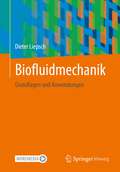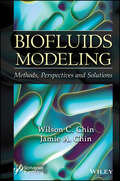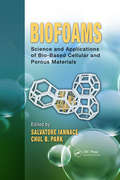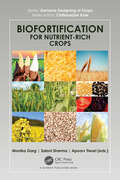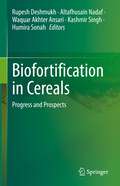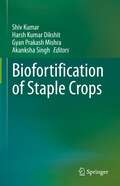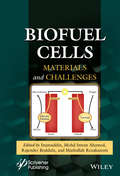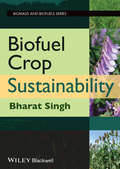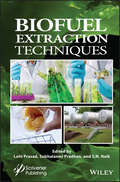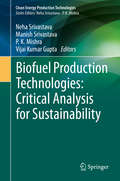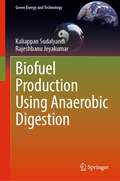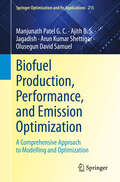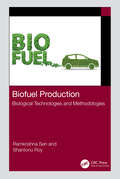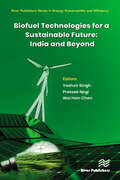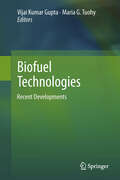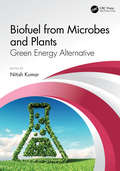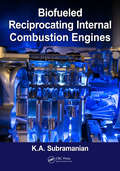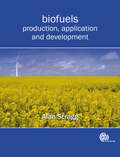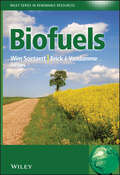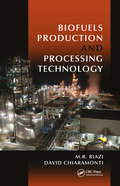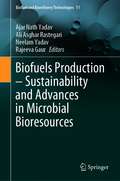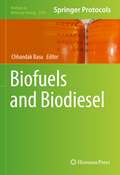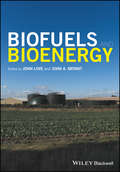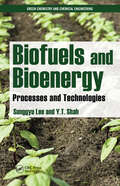- Table View
- List View
Biofluidmechanik: Grundlagen und Anwendungen
by Dieter LiepschDieses Buch führt Sie in die Grundlagen der Biofluidmechanik einWie funktioniert der menschliche Blutkreislauf? Wie arbeiten Mikrozirkulationsvorgänge? Mit diesen und vielen weiteren Fragen der Strömungsuntersuchung beschäftigt sich die Biofluidmechanik. Dieses Buch gewährt ihnen interessante Einblicke in die Grundlagen der Biofluidmechanik.Die Biofluidmechanik ist eine thematisch sehr breit gestaffelte Wissenschaft. Sie erforscht die Gesetzmäßigkeiten der Bewegung, des Kräftegleichgewichtes und der Strömungstechnik von Fluiden. Hierzu gehören unter anderem:• Atmung• Blutkreislauf• Mikrozirkulationsvorgänge• Lymphströmungen• Künstliche Gefäßersatze• Gefäßprothesen aus verschiedenen Materialien• Künstliche Herzklappen• Urologische Messungen• Künstliche Harnleiter• Blutrheologie• Transport durch Membranen• Bewegung geladener Partikel• Ionen in Lösungen• Vibrationen• Wellenfortpflanzung und SchockwellenWichtiges Grundlagenwissen der Biofluidmechanik in einem Buch In seinem Buch gibt der Autor einen ausführlichen Überblick über die Grundlagen der Biofluidmechanik und stellt die folgenden Themen detailliert vor:• Einleitung in die Biofluidmechanik• Physikalische Grundlagen von Fluiden• Rheologische Grundlagen• Biofluide (Körperflüssigkeiten) in Menschen und Tieren• Grundlegende theoretische Fluid- bzw. hämodynamische Betrachtungen• Medizinische Grundlagen, menschliches Kreislaufsystem, Blutgefäße, Herz, Lungenmechanik und Atmung• Besonderheiten und Messmethoden der Biofluidmechanik• Anwendungen und Beispiele in Modellen, diagnostische und therapeutische BedeutungAufgrund des hohen Praxisbezugs ist dieses Buch über die Biofluidmechanik nicht nur für Studenten, sondern auch für Beschäftigte in Gesundheitsforschung und Medizin ein wichtiges und hilfreiches Grundlagenwerk.
Biofluids Modeling: Methods, Perspectives, and Solutions
by Wilson C. Chin Jamie A. ChinBIOFLUIDS MODELING The first book offering analytical and modern computational solutions to important biofluids problems, such as non-Newtonian flows in blood vessels, clogged arteries and veins, bifurcated arteries and veins, arbitrary stent geometries, tissue properties prediction, and porous media Darcy flow simulation in large-scale organ analysis, this is a must-have for any library. This book introduces new methods for biofluids modeling and biological engineering. The foregoing subjects are treated rigorously, with all modeling assumptions stated and solutions clearly derived. But that’s not all. Key supporting physics-based ideas, algorithmic details, and software design interfaces are equally emphasized, in order to support our overriding objective of getting the anatomical and clinical information that physicians need. Importantly, this volume provides a self-contained exposition that includes all required biological concepts, plus the background preparation needed in fluid mechanics, basic differential equations, and modern numerical analysis. The presentation style will appeal to medical practitioners, researchers, biomedical engineers, and students interested in quantitative fluid flow modeling, as well as engineering students eager to learn about advances in a rapidly growing and changing biological science. As such, the book represents “must-reading” suitable at the advanced undergraduate level, and motivated readers should be able to embark on related research following guided study.
Biofoams: Science and Applications of Bio-Based Cellular and Porous Materials
by Salvatore Iannace Chul B. ParkAddresses a Growing Need for the Development of Cellular and Porous Materials in IndustryBuilding blocks used by nature are motivating researchers to create bio-inspired cellular structures that can be used in the development of products for the plastic, food, and biomedical industry. Representing a unified effort by international experts, Biofoams
Biofortification for Nutrient-Rich Crops (Genome Designing of Crops)
by Monika Garg Saloni Sharma Apoorv TiwariBiofortification is a widely accepted cost-effective agricultural strategy to improve the nutrient deficiency in populations. It is especially useful in low income and developing nations. Strategies for biofortification employ crop breeding, targeted genetic alteration, and agronomy, show promise for addressing multiple forms of human malnutrition. To increase the bioavailability of food nutrients, biofortification efforts must focus on improving the nutrient content of food and decreasing anti-nutrients.This book covers the basics of biofortification, international efforts, challenges, opportunities, and the use of the latest omics technologies in addition to classical approaches. It covers the most studied micronutrients, vitamin biofortification, and the new topics in dietary fibers, starch quality, and phenolics. It uniquely covers the antinutrients like phytic acid, ODAP, and Glucosinolates. It also reviews food bioavailability, scientific research, and meta-analyses to assess the health-promoting efficacy of different nutrients. The book attempts to cover all bases, from decision considerations to prospects, as well as biofortification of nutrients, antinutrient reduction, and the use of latest technology to aid in the nutritional enhancement of virtually all recorded food crops.
Biofortification in Cereals: Progress and Prospects
by Altafhusain Nadaf Rupesh Deshmukh Humira Sonah Waquar Akhter Ansari Kashmir SinghThe book addresses recent advances in biofortification using different approaches like foliar fertilizer, plant breeding, and genetic engineering as well as its utilization for improvement of nutritional quality of cereals. The content compiled is contributed by the renowned scientists actively working in the area of the cereal biofortification. This is an authentic, reliable, and exhaustive compilation bringing together the technological advancements, fundamental principles, and applicability of scientific innovations in biofortification. It also discusses policies and regulations for the implication of various strategies. It is useful reading material for researchers and students in the field.
Biofortification of Staple Crops
by Shiv Kumar Akanksha Singh Harsh Kumar Dikshit Gyan Prakash MishraThis edited book brings together comprehensive information on various aspects of the biofortification of staple crops. It addresses the present status of food and nutritional security and highlights the importance of micronutrients in human health, a historical account of biofortification, current approaches and challenges, crop-specific biofortification efforts and various breeding approaches, including conventional, and genomics enabled improvement. It also explains the efficacy of biofortification, bioavailability, and future thrust. It is an inclusive source of information on different aspects of micronutrients in crops of global importance. Malnutrition is a serious global issue, with millions of people being undernourished, several suffering from micronutrient deficiencies, and the adult population struggling with obesity. Despite significant economic progress, South Asia and Sub-Saharan Africa are still home to an undernourished population. Nutrition-related health problems are related to hidden hunger and are widespread in the developing world. Women and preschool children are more vulnerable. Even though global food production has increased manifolds, estimates indicate that over 60% of the world’s population is deficient in essential micronutrients such as iron, zinc, iodine, and selenium, often causing health problems and developmental delays. Linking agricultural production with human nutrition and health is crucial for ensuring nutrition security. Much research has been carried out to assess genetic diversity related to micro-nutrients in staple crops, their bioavailability, and the efficacy of biofortified germplasm. Biofortified varieties developed in different crops through conventional breeding are being up-scaled for reducing the micronutrient deficiencies in other countries. This book is a ready reference for researchers, academicians, extension personnel, policymakers, students, and value chain stakeholders engaged in agriculture, nutrition, and health sectors promoting nutrition-sensitive diets.
Biofuel Cells: Materials and Challenges
by Inamuddin Mohd Imran Ahamed Rajender Boddula Mashallah RezakazemiRapid industrialization and urbanization associated with the environment changes calls for reduced pollution and thereby least use of fossil fuels. Biofuel cells are bioenergy resources and biocompatible alternatives to conventional fuel cells. Biofuel cells are one of the new sustainable renewable energy sources that are based on the direct conversion of chemical matters to electricity with the aid of microorganisms or enzymes as biocatalysts. The gradual depletion of fossil fuels, increasing energy needs, and the pressing problem of environmental pollution have stimulated a wide range of research and development efforts for renewable and environmentally friendly energy. Energy generation from biomass resources by employing biofuel cells is crucial for sustainable development. Biofuel cells have attracted considerable attention as micro- or even nano-power sources for implantable biomedical devices, such as cardiac pacemakers, implantable self-powered sensors, and biosensors for monitoring physiological parameters. This book covers the most recent developments and offers a detailed overview of fundamentals, principles, mechanisms, properties, optimizing parameters, analytical characterization tools, various types of biofuel cells, all-category of materials, catalysts, engineering architectures, implantable biofuel cells, applications and novel innovations and challenges in this sector. This book is a reference guide for anyone working in the areas of energy and the environment.
Biofuel Crop Sustainability
by Bharat SinghBiofuel Crop Sustainability brings together the basic principles of agricultural sustainability and special stipulations for biofuels, from the economic and ecological opportunities and challenges of sustainable biofuel crop production to the unique characteristics of particular crops which make them ideal for biofuel applications. This book will be a valuable resource for researchers and professionals involved in biofuels development and production as well as agriculture industry personnel.Chapters focus the broad principles of resource management for ecological, environmental and societal welfare, the sustainability issues pertaining to several broad categories of biofuel crops , as well as the economics and profitability of biofuels on both a local and international scale. Coverage includes topics such as utilizing waste water for field crop irrigation and algae production, reliability of feedstock supply, marginal lands, and identifying crops with traits of significance for survival and growth on low fertility soils. The development of production practices with low external inputs of fertilizer, irrigation, and pesticides is also covered.Biofuel Crop Sustainability will be a valuable, up-to-date reference for all those involved in the rapidly expanding biofuels industry and sustainable agriculture research fields.
Biofuel Extraction Techniques: Biofuels, Solar, and Other Technologies
by Lalit Prasad Subhalaxmi Pradhan S. N. NaikBIOFUEL EXTRACTION TECHNIQUES The energy industry and new energy sources and innovations are rapidly changing and evolving. This new volume addresses the current state-of-the-art concepts and technologies associated with biofuel extraction technologies. Biofuels are a viable alternative to petroleum-based fuel because they are produced from organic materials such as plants and their wastes, agricultural crops, and by-products. The development of cutting-edge technology has increased the need for energy significantly, which has resulted in an overreliance on fossil fuels. Renewable fuels are an important subject of research because of their biodegradability, eco-friendliness, decrease in greenhouse gas (GHG) emissions, and favorable socioeconomic consequences to counteract imitations of fossil fuels. Different extraction techniques are used for the production of biofuel from renewable feedstocks. A good example is biodiesel, a promising biofuel which is produced by transesterification of plant-based oils. Extraction of oil includes traditional methods, solvent extraction, mechanical extraction, microwave-assisted and ultrasonic-assisted methods. Many innovative techniques are also used to overcome the limitations of conventional methods. Microwave-assisted and ultrasonic-assisted are some of the new techniques which include the pre-treatment of the raw material using either ultrasonic waves or radio waves which helps in increasing the efficiency of the extraction of oil and improves the final quality of the oil. Written and edited a team of experts in the field, this exciting new volume covers all of these technologies with a view toward giving the engineer, scientist, or other professional the practical solutions for their day-to-day problems. It also contains the theory behind the practical applications, as well, making it the perfect reference for students and engineers alike. Whether for the veteran engineer or scientist, the student, or a manager or other technician working in the field, this volume is a must-have for any library.
Biofuel Production Technologies: Critical Analysis for Sustainability (Clean Energy Production Technologies)
by P. K. Mishra Vijai Kumar Gupta Neha Srivastava Manish SrivastavaProduction and utilization of sustainable energy toward maintaining a clean environment is a major challenge. At the same time, the continued depletion of fossil fuels and the global dependency on non-renewable fuels is a chief concern. Moreover, the long-term economic and environmental issues associated with the high utilization of fossil fuel, such as global warming, are also important, particularly in the context of the predicted increase in the global population to around 5 billion by 2050. In recent years, researchers have been investigating alternative, renewable fuels to replace fossil fuels. Of the various options, biofuels are especially attractive due to their low production costs and the fact that they are pollution free. Also known as transportation fuels, their energy is derived from biological resources or through the biological processes. Biofuels such as biohydrogen, biomethane, biogas, ethanol and butanol offer a number of advantages and can be economically produced from cellulosic biomass. As such, they can play a vital role in sustainably meeting future energy demands. Biofuels have the potential to become a global primary energy source, offering significant reductions in greenhouse gas emissions as well as opportunities to increase economic and social development in rural communities and reduce the problems associated with waste disposal. However, low yields and lack of process technology are some of the aspects that need to be addressed. This book offers an overview of existing biofuels and the technologies to solve the problems associated with their practical implementation. Evaluating the biofuel options and discussing the opportunities and risks in relation to resources, technologies, practices, markets and policy, it provides insights into the development of economically viable bioenergy industries.
Biofuel Production Using Anaerobic Digestion (Green Energy and Technology)
by Kaliappan Sudalyandi Rajeshbanu JeyakumarThis book provides lucid and instructive information about waste biomass, its potential, and the methods employed in energy generation. Topics covered include the basic principles, applications, recent advances, and the technical and economic considerations of waste-to-energy (WTE) technology. It highlights and elucidates essential concepts, mechanisms, applications, and useful outcomes of WTE technologies. In addition, it also provides a few example problems with design data for energy generation from waste biomass which will help the readers to understand the basics of WTE technologies. The book is structured with an overview at the start of each chapter presenting an outline of its content and a list of relevant discussions targeted toward readers. To illustrate the types of waste biomass, principles, and process of various thermal and biochemical process technologies, over 90 illustrations including graphs, diagrams, and photographs are provided. To help the readers improve their knowledge of the subject and to increase the utility of this book, the characteristics of waste biomass, operation conditions of different processes, and global status of WTE technologies are provided in tabular format. For that purpose, over 50 tables are provided. Selected references are also provided for this book. This book is primarily intended for researchers and professionals working in the area of bioenergy. It can also be used as a primary or secondary text for graduate courses and professional training programs.
Biofuel Production, Performance, and Emission Optimization: A Comprehensive Approach to Modelling and Optimization (Springer Optimization and Its Applications #215)
by Jagadish Manjunath Patel G. C. Ajith B. S. Arun Kumar Shettigar Olusegun David SamuelThis book explores the urgent quest for sustainable energy solutions by examining potential renewable energy sources that meet global demands. As fossil fuels deplete at an alarming rate, this book addresses the critical challenges in selecting sustainable feedstocks and optimizing processes for industrial-scale biodiesel production. With a focus on Garcinia-gummi-gutta seeds as a promising feedstock, the book provides a detailed analysis of oil extraction, biofuel conversion, and the practical application of biodiesel in diesel engines. Key concepts explored include selecting and optimizing transesterification variables, engine performance, and emission characteristics. The authors employ cutting-edge tools such as statistical design of experiments and artificial intelligence to offer insights into biodiesel production's physics, kinetics, and mechanics. Readers will discover experimental results, intelligent modeling techniques, and optimization strategies that enhance biodiesel yield and engine efficiency while minimizing emissions. This resource is designed for engineers and researchers in renewable energy and biofuel production. It offers a systematic framework from feedstock selection to engine optimization, making it invaluable for those seeking to advance their knowledge in sustainable energy solutions. Whether you're a novice or a seasoned professional, this book provides the tools and insights needed to drive innovation in biodiesel production at an industrial scale.
Biofuel Production: Biological Technologies and Methodologies
by Ramkrishna Sen Shantonu RoyBiofuels and bioenergy have emerged as an alternative option based on their sustainability, concomitant waste treatment, and site-specific flexibility. This book encompasses all the knowhow of different biofuel production processes through biological methods. It describes recent advancements in all major biofuel technologies such as biohydrogen, biomethane, bioethanol, syngas and so forth. Related protocols supported by schematic representation are included, encompassing comprehensive up-to-date scientific and technological information in biofuels and bioenergy. Features: Includes practical approaches focused on process design and analysis in biofuel production via biological routes Discusses kinetic equations of different microbial systems Provides comprehensive coverage of biochemical kinetics and equations related to biofuel process Describes protocols for setting up of experiments for pertinent biofuel technologies Emphasis on practical engineering approaches and experiments This book is aimed at researchers and graduate students in chemical, biochemical and bioprocess engineering, and biofuels.
Biofuel Technologies for a Sustainable Future: India and Beyond (River Publishers Series In Energy Sustainability And Efficiency Ser.)
by Yashvir Singh Prateek Negi Wei Hsin ChenThis book examines the key aspects that will define future sustainable energy systems: biofuels, green nanomaterials and the production of bioethanol and bio-hydrogen from bio-waste. Bio-based fuels are the future energy carriers for internal combustion engines as they have lower environmental impact and higher efficiency. The book clearly illustrates the requirement for a unified engineering approach based on solid mathematical and engineering principles. Aside from the ecological advantages, support for sustainable energy can help the socioeconomic situation of developing countries by providing a consistent supply of new energy along with the generation of new job opportunities. The sustainable energy applications and existing contextual investigations provide useful guidance for the broad comprehension of the significance of sustainable energy. Technical topics discussed in the book include: Thermochemical Conversion process; Catalytic conversion process; Rankine cycle; Nanomaterials;
Biofuel Technologies: Recent Developments (Biofuel and Biorefinery Technologies #3)
by Maria G. Tuohy Vijai Kumar GuptaBiofuels are considered to be the main potential replacement for fossil fuels in the near future. In this book international experts present recent advances in biofuel research and related technologies. Topics include biomethane and biobutanol production, microbial fuel cells, feedstock production, biomass pre-treatment, enzyme hydrolysis, genetic manipulation of microbial cells and their application in the biofuels industry, bioreactor systems, and economical processing technologies for biofuel residues. The chapters provide concise information to help understand the technology-related implications of biofuels development. Moreover, recent updates on biofuel feedstocks, biofuel types, associated co- and byproducts and their applications are highlighted. The book addresses the needs of postgraduate researchers and scientists across diverse disciplines and industrial sectors in which biofuel technologies and related research and experimentation are pursued.
Biofuel from Microbes and Plants: Green Energy Alternative
by Nitish KumarGlobal concern for energy security and environmental protection has put great emphasis on the search for alternative energy sources, particularly for the transport sector. Biofuels have emerged as a highly promising source of alternative energy, and have drawn global research and development for their production using biomass. With the increasing worldwide demand for energy, along with the depletion of conventional fossil fuel reserves, there has been growing global interest in developing alternative sources of energy. There has also been concern in growing economies regarding energy security. Biofuels offer much promise on these frontiers. In addition to these factors, they also have a reduced environmental impact in comparison to fossil fuels. Biofuels from Microbes and Plants provides state-of-the-art information on the status of biofuel production and related aspects. Academics, researchers, engineers, and technologists will develop a greater understanding of the relevant concepts and solutions to the global issues related to achieving alternative energy applications for future energy security, as well as environmental sustainability in medium- and large-scale industries. Key Features Detailed overview of the alternative energy field and the role of biofuels as new energy sources Detailed accounts of the production of biodiesel from non-conventional bio-feedstocks such as algae, microbes, and vegetable oils Recent updates about biotechnological improvements of plant and microbial sources for biofuel production
Biofueled Reciprocating Internal Combustion Engines
by K. A. SubramanianBiofuels such as ethanol, butanol, and biodiesel have more desirable physico-chemical properties than base petroleum fuels (diesel and gasoline), making them more suitable for use in internal combustion engines. The book begins with a comprehensive review of biofuels and their utilization processes and culminates in an analysis of biofuel quality and impact on engine performance and emissions characteristics, while discussing relevant engine types, combustion aspects and effect on greenhouse gases. It will facilitate scattered information on biofuels and its utilization has to be integrated as a single information source. The information provided in this book would help readers to update their basic knowledge in the area of "biofuels and its utilization in internal combustion engines and its impact Environment and Ecology". It will serve as a reference source for UG/PG/Ph.D. Doctoral Scholars for their projects / research works and can provide valuable information to Researchers from Academic Universities and Industries. Key Features: • Compiles exhaustive information of biofuels and their utilization in internal combustion engines. • Explains engine performance of biofuels • Studies impact of biofuels on greenhouse gases and ecology highlighting integrated bio-energy system. • Discusses fuel quality of different biofuels and their suitability for internal combustion engines. • Details effects of biofuels on combustion and emissions characteristics.
Biofuels
by Alan ScraggProviding the world's growing population with its increasing demands for energy is a major challenge for science, business and society alike. Energy can be generated from many sources, but not all sources are suitable for every application. Much of today's technology has been built on solid, liquid and gaseous fuels derived from fossil sources. However, the supply of these is finite and their combustion produces carbon dioxide, one of the gases responsible for global warming. Therefore, alternative sources of energy are required which are renewable, sustainable and carbon neutral. This textbook explores the production of biofuels as alternatives to fossil fuels, focusing on the technological issues that need to be addressed for any new fuel source. Each type of biofuel currently in production is considered in detail, covering the benefits and problems with production and use and the potential for biological material to provide sufficient energy for the world's population - the principles on which future fuel development are based.
Biofuels
by Erik Vandamme Wim SoetaertThis book gives a broad overview of the key topics in this field of study, approaching them from a technical and economic angle giving the reader a comprehensive insight into biofuels as a whole. Dealing specifically with liquid and gaseous biofuels that can be produced from renewable resources this text also gives a summary of the past, present and future production technologies and applications of biofuels. This book is particularly relevant as it highlights the extensive debate of the on-going global needs to find alternative fuels, making it not only a necessary text for working professionals and researchers in the field, but for anyone with an interest in sustaining the earth.
Biofuels Production and Processing Technology (Fuels and Petrochemicals)
by M. R. Riazi David ChiaramontiThe importance of biofuels in greening the transport sector in the future is unquestionable, given the limited available fossil energy resources, the environmental issues associated to the utilization of fossil fuels, and the increasing attention to security of supply. This comprehensive reference presents the latest technology in all aspects of biofuels production, processing, properties, raw materials, and related economic and environmental aspects. Presenting the application of methods and technology with minimum math and theory, it compiles a wide range of topics not usually covered in one single book. It discusses development of new catalysts, reactors, controllers, simulators, online analyzers, and waste minimization as well as design and operational aspects of processing units and financial and economic aspects. The book rounds out by describing properties, specifications, and quality of various biofuel products and new advances and trends towards future technology.
Biofuels Production – Sustainability and Advances in Microbial Bioresources (Biofuel and Biorefinery Technologies #11)
by Rajeeva Gaur Ajar Nath Yadav Ali Asghar Rastegari Neelam YadavThis book focuses on the different kinds of biofuels and biofuel resources. Biofuels represent a major type of renewable energy. As part of a larger bio-economy, they are closely linked to agriculture, forestry and manufacturing. Biofuels have the potential to improve regional energy access, reduce dependence on fossil fuels and contribute to climate protection. Further, this alternative form of energy could revitalize the forestry and agricultural sector and promote the increased use of renewable resources as raw materials in a range of industrial processes. Efforts are continuously being made to develop economically competitive biofuels, and microbes play important roles in the production of biofuels from various bioresources. This book elaborates on recent advances in existing microbial technologies and on sustainable approaches to improving biofuel production processes. Additionally, it examines trends in, and the limitations of, existing processes and technologies. The book offers a comprehensive overview of microbial bioresources, microbial technologies, advances in bioconversion and biorefineries, as well as microbial and metabolic engineering for efficient biofuel production. Readers will also learn about the environmental impacts and the influence of climate change on the sustainability of biofuel production. This book is intended for researchers and students whose work involves biorefinery technologies, microbiology, biotechnology, agriculture, environmental biology and related fields.
Biofuels and Biodiesel (Methods in Molecular Biology #2290)
by Chhandak BasuThis volume provides methods and protocols on principle, production, molecular aspects, and sustainability of biofuel and biodiesel. Chapters are divided into four sections detailing biofuel production, biodiesel production, molecular genetics, biotechnology of biofuel and biodiesel production, economics, and sustainability of biofuel production. Written in the highly successful Methods in Molecular Biology series format, chapters include introductions to their respective topics, lists of the necessary materials and reagents, step-by-step, readily reproducible laboratory protocols, and tips on troubleshooting and avoiding known pitfalls. Authoritative and cutting-edge, Biofuels and Biodiesel aims to be useful for researchers, students, and enthusiasts in the field of biofuel and biodiesel.
Biofuels and Bioenergy
by John A. Bryant John LoveWith increased public and scientific attention driven by factors such as oil price spikes, the need for increased energy security, and concerns over greenhouse gas emissions from fossil fuels, the production of fuels by biological systems is becoming increasingly important as the world seeks to move towards renewable, sustainable energy sources. Biofuels and Bioenergy presents a broad, wide-ranging and informative treatment of biofuels. The book covers historical, economic, industrial, sociological and ecological/environmental perspectives as well as dealing with all the major scientific issues associated with this important topic.With contributions from a range of leading experts covering key aspects, including: • Conventional biofuels.• Basic biology, biochemistry and chemistry of different types and classes of biofuel.• Current research in synthetic biology and GM in the development and exploitation of new biofuel sources.• Aspects relating to ecology and land use, including the fuel v food dilemma.• Sustainability of different types of biofuel.• Ethical aspects of biofuel production. Biofuels and Bioenergy provides students and researchers in biology, chemistry, biochemistry and chemical engineering with an accessible review of this increasingly important subject.
Biofuels and Bioenergy
by John A. Bryant John LoveWith increased public and scientific attention driven by factors such as oil price spikes, the need for increased energy security, and concerns over greenhouse gas emissions from fossil fuels, the production of fuels by biological systems is becoming increasingly important as the world seeks to move towards renewable, sustainable energy sources. Biofuels and Bioenergy presents a broad, wide-ranging and informative treatment of biofuels. The book covers historical, economic, industrial, sociological and ecological/environmental perspectives as well as dealing with all the major scientific issues associated with this important topic.With contributions from a range of leading experts covering key aspects, including: • Conventional biofuels.• Basic biology, biochemistry and chemistry of different types and classes of biofuel.• Current research in synthetic biology and GM in the development and exploitation of new biofuel sources.• Aspects relating to ecology and land use, including the fuel v food dilemma.• Sustainability of different types of biofuel.• Ethical aspects of biofuel production. Biofuels and Bioenergy provides students and researchers in biology, chemistry, biochemistry and chemical engineering with an accessible review of this increasingly important subject.
Biofuels and Bioenergy: Processes and Technologies (Green Chemistry and Chemical Engineering)
by Sunggyu Lee Y.T. ShahThe newest addition to the Green Chemistry and Chemical Engineering series from CRC Press, Biofuels and Bioenergy: Processes and Technologies provides a succinct but in-depth introduction to methods of development and use of biofuels and bioenergy. The book illustrates their great appeal as tools for solving the economic and environmental challenge
